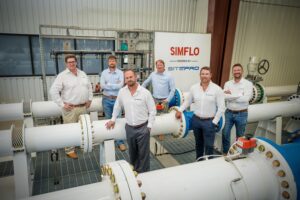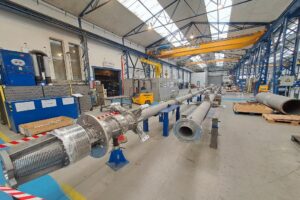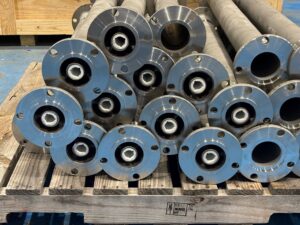KEEPING COOL UNDER PRESSURE
When J W Froehlich built their latest engine hot test system for Cosworth Technology, it was vital that all the components used in its manufacture, including pumps, were of the highest quality.
With a reputation for unrivalled reliability and efficiency, pump manufacturer Wilo-Salmson won the contract.
For 30 years, J W Froehlich has been a leading supplier of engine test systems, leak test equipment and automatic assembly equipment to the European automotive and mass production industries. A QS9000-TE certified company, J W Froehlich offers a wide range of leak test methods and technology throughout Europe, from standard pressure decay systems to the latest 'zero resistant' mass flow measurement systems. Serving the UK is the company's manufacturing facility near Basildon where testing, assembly and final validation processes are carried out.
Recently, J W Froehlich UK designed and manufactured their first engine hot test system for Cosworth Technology, Wellingborough, a major supplier of integrated powertrain solutions to the global automotive industry. Designed to test a range of Bi-Turbo V6 and V8 engines, the test rig includes an A.C. Dynometer, to enable the engine to be tested through a wide range of running loads, and features pumps supplied by Wilo-Salmson.
The fully automated, computer-controlled engine hot test system monitors engine performance using sensors that provide Cosworth Technology with an accountable record highlighting critical performance statistics. As such it is essential that each engine is tested under the same parameters to ensure consistent and accurate results. For this reason much consideration was given to the quality of the component parts of the hot test system, including the four pumps designed to move the water and glycol coolant through the engine during testing.
High operating temperatures can affect an engine's performance and as such it is vital that the pumps maintain the correct pressure of the coolant at all times, fluctuation in the pump's performance can seriously affect test results. Reliability is also an important factor to consider as pump failure could result in damage to the engine being tested.
After careful consideration, with efficiency, reliability, and consistent pump operation i.e. no unwanted variations, as the most important factors to consider, J W Froehlich chose to use Wilo-Salmson's Top S and IPE pumps.
During tests, an adapter plate coupled with the engine in the test cell provides water, oil and petrol, with cooling fluids supplied via a quick-fix docking station housing the four pumps. The Top S circulating pump forces a coolant mixture comprising glycol and water through the engine while a second Top S pump is used to fill the water jacket (replacing the radiator) from a storage tank, automatically shutting down once the water jacket is full. Two smaller pumps, both single IPE models, are used to circulate cooling fluids through the intercoolers attached to the engine's turbos, preventing them from overheating.
To date, the engine hot test system has proved to be an overwhelming success for all the companies involved, not least of all Wilo-Salmson. Howard Davies, Managing Director at Wilo-Salmson says, "Over the past 70 years we have built a reputation for quality and innovation and our acknowledged competence is the result of a wide product range, technical know-how and effective quality management, something which Froehlich, as suppliers of the engine hot test system, obviously recognise."
For further information, please contact Mark Sowden, Marketing Manager, Wilo Salmson Pumps Ltd, Centrum 100, Burton-on-Trent, Staffordshire, DE14 2WJ. Tel. 01283 523000, Fax. 01283 523099. Email. sales@wilo.co.uk or visit the Wilo Salmson web site at :
Source: WILO SE







